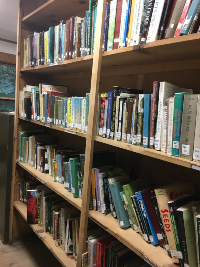One of the lasting regrets about my childhood is not taking part in any formalized “summer camp” experience. And it certainly wasn’t because of a lack of opportunities. Growing up in rural Texas, everything from Boy Scouts to lakeside vacation Bible school offered adventurous youths a chance to explore the outdoors.
But I was a skittish, clean-freak type of kid, more comfortable staying inside reading a good book (or playing video games) than going out in the wild, uncertain outdoors. I also grew up as the internet was beginning to assert its dominance in our collective culture. And I wholeheartedly embraced the chance to be a “plugged in” millennial.
Fast forward two decades or so and the world today seems connected 24/7, with teens spending upwards of nine hours a day on the internet. As the Online Marketing Manager for Island Press, I navigate these new waters pretty comfortably, for better or worse. But working for an environmental publisher also means that I occasionally have to go out and get my hands a little dirty (sometimes literally!).

Such was the case earlier this summer when I visited Nature Camp, an environmental education summer camp that partnered with Island Press on our latest sweepstakes. Tucked away in a scenic valley in the Blue Ridge Mountains of Rockbridge County, Virginia, Nature Camp’s mission is to train a corps of knowledgeable youth to conserve and protect the environment and to become wise stewards of the natural resources of the earth. The daily schedule is chiefly organized around intimate, 90-minute classes on an array of science subjects such as geology (rocks), herpetology (amphibians), bryology (mosses), and ornithology (birds). Outside of class time, campers participate in a variety of structured outdoor activities such as swimming, hiking, and nature writing.
When I arrived on a Sunday afternoon, campers and staff were trickling back from a day-long hike in the surrounding mountains. The campers, age 12-14, were a chatty bunch, eager to welcome a new face to camp and share some of its magic.
“It’s a good environment,” explained one third-year camper. “Even though the Sunday hikes are tiring, I feel calmly and pleasantly exhausted.”
“I did something cool and am happy about it,” added another. “It’s hard to feel that way after a day at school.”

Over my two-day visit, a lot of campers shared similar feelings about how Nature Camp was filling some gap left behind by the typical American school experience. Maximillian Manuel, Nature Camp’s Assistant Director, echoed this sentiment, telling me:
“This place provides a unique experience. It’s so incredibly hands on. Even if you’re lecturing you can go out and find an example out in the woods and have real-time illustration. I think sometimes in schools it’s not cool to care about things. This is an environment where kids can come out of their shell and get excited about learning things.”
Taimir Gore, a longtime staffer who struggled in school growing up, said attending Nature Camp as a kid gave him that chance to break out of his shell and learn about science in a new way. “It was easier to be me and weird here,” he said. “I made a lot of great friends as a Nature Camp camper.”
Clearly the Nature Camp experience resonates with kids at an early age. On our tour of the facility, Nature Camp Director Philip “Flip” Coulling said that of the 88 campers on the high school session, all but three had been to Nature Camp before.
“Our vision is very much not to radically change Nature Camp,” he said. “But that’s not to say we rest on our laurels here. We try to keep up to date on what we teach and keep up with trends in education. We want to be relevant and want kids to want to come here to learn.”

impressive library
Another part of Nature Camp’s educational model that sets it apart from the typical summer camp is its vast library, which includes hundreds of textbooks, field guides, and other resources (including a handful of Island Press books!) pertinent to just about every class taught here. The idea is that instead of just Googling the answer or copying from Wikipedia, campers can use the library as a resource for their final project or to build on the lessons learned in class. How retro!
As you might imagine, this separation from Google and the worldwide web was something I was eager to ask campers about. What’s it like to be completely cut off from the outside world for two weeks? And how on earth do today’s kids function without their cell phones, Instagram, or Netflix?
Perhaps unsurprisingly, the responses varied.
For some campers, it’s a bit of a challenge. One girl, visiting Nature Camp from Richmond, likened being separated from her cell phone to a “strong detox.” Many other campers, though, admitted they were often on their phones at home because of boredom. With so many classes and activities at Nature Camp, they hardly noticed being “unplugged.”
Maybe there’s hope for the future after all?
As for what campers take home with them, more than a few mentioned the friendships they had made. And beyond just learning the importance of composting or conserving electricity, campers are leaving with a greater appreciation and understanding of the natural world.
“Nature Camp opens your eyes to what’s out there,” said Lucy, a first-time camper. “Seeing the mountains and seeing everyone have a good time. To sit back and realize this exists and I am a part of it. It’s a life-changing experience.”
It’s certainly an experience I wished I had had as a kid, one that I hope more kids can take part in.
To learn more about Nature Camp, check out the video below and visit their website: https://naturecamp.net/


